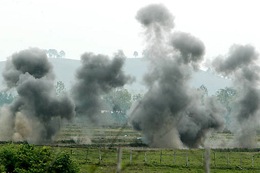 Weapons of mass destruction
Weapons of mass destruction
The use of weapons of mass destruction, including nuclear, biological and chemical weapons, is limited to varying degrees by international treaties and conventions. Chemical and biological weapons are sometimes bracketed together because they are different from the guns, explosives, rockets and missiles that are known as conventional weapons.
Biological and chemical weapons
 Chemical weapons are poisons. They have toxins that kill or incapacitate people when they come into contact with them. Chemical weapons include mustard gas, nerve agents and other chemicals that can incapacitate, asphyxiate or irritate and blister skin.
Chemical weapons are poisons. They have toxins that kill or incapacitate people when they come into contact with them. Chemical weapons include mustard gas, nerve agents and other chemicals that can incapacitate, asphyxiate or irritate and blister skin.
Biological weapons act on the human life system and are often developed from living organisms like viruses or bacteria. They are greatly feared because relatively small amounts of these organisms, like anthrax, can cause immense numbers of casualties.
The ban on chemical and biological weapons is so absolute that it does not matter whether they are lethal or not, or whether they are allowed by domestic laws. For example, CS gas can be used by police to control riot situations, but its use is prohibited in armed conflict.
Nuclear weapons
 Today there is no comprehensive and universal prohibition on the use of nuclear weapons in either customary or conventional international law.
Today there is no comprehensive and universal prohibition on the use of nuclear weapons in either customary or conventional international law.
However, in 1996 the International Court of Justice, the principal justice arm of the United Nations, gave an Advisory Opinion about the Legality of the threat or use of nuclear weapons. The court’s 14 judges examined treaty law, customary rules and State practice with regard to nuclear weapons at that time and, based on their analysis, concluded unanimously that the principles and rules of international humanitarian law apply to the use of nuclear weapons. They added that the use of nuclear weapons would generally contradict the principles and rules of international humanitarian law.
In 2011 the Council of Delegates of the International Red Cross and Red Crescent Movement expressed its deep concern about nuclear weapons, in particular due to:
-
the destructive power of nuclear weapons
-
the unspeakable human suffering they cause
-
the difficulty of controlling their effects in space and time
-
the threat they pose to the environment and to future generations
-
the risks of escalation they create
The Red Cross and Red Crescent Movement appealed to all states to ensure that they never use nuclear weapons again, regardless of their views on the weapons’ legality, and that they negotiate in good faith and with urgency and determination agreements to prohibit the use of and eventual complete elimination of nuclear weapons through legally binding international agreements.